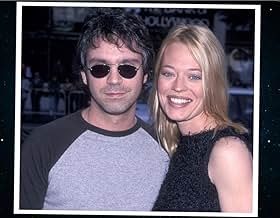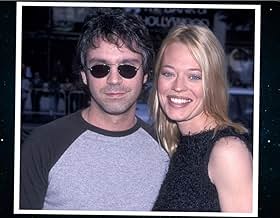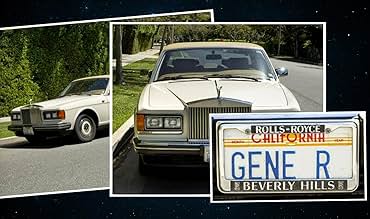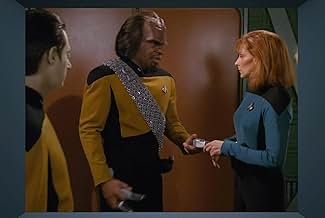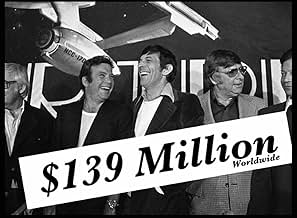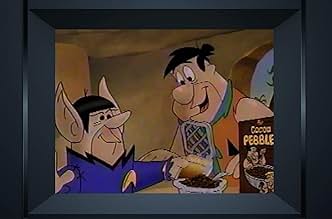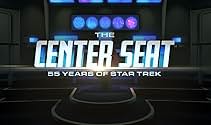Chronicles rare and fascinating details of how "Star Trek" began, where it's been, and how it's going where no television series has gone before.Chronicles rare and fascinating details of how "Star Trek" began, where it's been, and how it's going where no television series has gone before.Chronicles rare and fascinating details of how "Star Trek" began, where it's been, and how it's going where no television series has gone before.
Browse episodes
Featured reviews
There's a great documentary about the history of Star Trek to be made but this ain't it. There are some good interviewees -- writers, producers, cast members, and others actually involved with the show -- but there's just as much or more useless stuff from people who just sound like superfans reciting history which should have instead been in the narration. If these people actually do have real expertise/in-depth knowledge, it's not made plain by their onscreen identifications. One is billed as "professor of sociology". So what? Does he teach a Trek class? Has he written a book? Why is he being interviewed instead of some other professor? If you want me to care what he has to say, how about telling me his actual credentials on the subject matter? Another is said to be a "writer and producer". Writer of what? Producer of what? Those who actually worked on Trek shows are identified as such, so who is this guy and why should I care about his opinions?
As for the actual narration, instead of an informative voice we get Gates McFadden doing her best to sound like she's saying interesting things--and regularly being forced to repeat herself because this is designed with ad breaks in mind--often in an inappropriately silly/jokey way. Her disembodied voice sometimes literally "interacts" with the interviewees, which I found to be a distractingly awful stylistic choice.
Worst of all is what's onscreen when it's not interviews or snippets from the shows/movies themselves. Every time D. C. Fontana is mentioned, they trot out the exact same picture -- a weird glamour shot from when she was very young. Roddenberry is represented by three, maybe four, repeatedly recycled photos. They endlessly reuse two photos of Robert Wise but only one of him actually on set of The Motion Picture. At some point, it becomes embarrassing how little effort the producers of this spent researching archival materials. And there's also absolutely moronic cutaway inserts of things like film being placed into a can, pointless stock footage and, in one particularly cringeworthy moment somebody's disembodied hands pounding on a table because an interviewee is telling a story which ends that way. Much of these--particularly the stock footgae--get repeated many times as well. These are the choices of people who have no business making documentaries and/or greedy Paramount executives who want to promote the cash-cow they've been milking for gazillions of dollars in the cheapest way possible, with no actual respect for the people who produced it for them.
As for the actual narration, instead of an informative voice we get Gates McFadden doing her best to sound like she's saying interesting things--and regularly being forced to repeat herself because this is designed with ad breaks in mind--often in an inappropriately silly/jokey way. Her disembodied voice sometimes literally "interacts" with the interviewees, which I found to be a distractingly awful stylistic choice.
Worst of all is what's onscreen when it's not interviews or snippets from the shows/movies themselves. Every time D. C. Fontana is mentioned, they trot out the exact same picture -- a weird glamour shot from when she was very young. Roddenberry is represented by three, maybe four, repeatedly recycled photos. They endlessly reuse two photos of Robert Wise but only one of him actually on set of The Motion Picture. At some point, it becomes embarrassing how little effort the producers of this spent researching archival materials. And there's also absolutely moronic cutaway inserts of things like film being placed into a can, pointless stock footage and, in one particularly cringeworthy moment somebody's disembodied hands pounding on a table because an interviewee is telling a story which ends that way. Much of these--particularly the stock footgae--get repeated many times as well. These are the choices of people who have no business making documentaries and/or greedy Paramount executives who want to promote the cash-cow they've been milking for gazillions of dollars in the cheapest way possible, with no actual respect for the people who produced it for them.
I can't say that I'm happy with my assessment and I'm sure most others won't be as well, but the pace and editing of this first episode are so bad that I'm having trouble finishing it and may not watch the other three I've recorded.
In Philadelphia, there is the Franklin Institute, a center for science, scientific history, science demonstrations, and industrial scientific testing. It's quite a place and I've gone there since I was very young. It's been a while since I visited, but the last time I was there, drinking in the exhibits around me, I watched as schoolchildren too immature to understand what they were seeing absolutely raced from exhibit to exhibit trying to find the button to push to make the display do something. They would rush up to it, frantically hammer away at whatever initiated the demo, and hunted to see what would happen. If it moved, lit up, make a sound or whatever, they watched for five seconds. If pushing the button didn't result in an INSTANT payoff...two seconds, then on to the next exhibit. Nobody stopped to look, wonder, read, or try to understand what was happening.
I am sure that the editor of this series was one of those kids.
Hyper-fast cuts, contributors flashed on the screen for so short a time that you can see what they look like, what their name is, or what they are saying, pick any two, cut-ins of scenes from shows that might well be funny but go by so quickly that they are blips...this bears all the hallmarks of someone too young to know how to edit for an audience who is seeing the material for the first time, not someone who has been spending hours with each scene. It's an absolute mess. No attention span whatsoever. No depth of examination. No desire to discover, just to get to the next bullet point.
I'm going to boldly go back to the TV now. I think there may be 15 painful minutes left of the fist episode. There are other "history of Star Trek" films and videos that are not frenetic and juvenile that tell the same story.
Harlan Ellison; story of how unhappy he was with the rewrite of, "City on the Edge of Forever" is mentioned. I can only imagine how irate he' d be if he was around to see this mess.
In Philadelphia, there is the Franklin Institute, a center for science, scientific history, science demonstrations, and industrial scientific testing. It's quite a place and I've gone there since I was very young. It's been a while since I visited, but the last time I was there, drinking in the exhibits around me, I watched as schoolchildren too immature to understand what they were seeing absolutely raced from exhibit to exhibit trying to find the button to push to make the display do something. They would rush up to it, frantically hammer away at whatever initiated the demo, and hunted to see what would happen. If it moved, lit up, make a sound or whatever, they watched for five seconds. If pushing the button didn't result in an INSTANT payoff...two seconds, then on to the next exhibit. Nobody stopped to look, wonder, read, or try to understand what was happening.
I am sure that the editor of this series was one of those kids.
Hyper-fast cuts, contributors flashed on the screen for so short a time that you can see what they look like, what their name is, or what they are saying, pick any two, cut-ins of scenes from shows that might well be funny but go by so quickly that they are blips...this bears all the hallmarks of someone too young to know how to edit for an audience who is seeing the material for the first time, not someone who has been spending hours with each scene. It's an absolute mess. No attention span whatsoever. No depth of examination. No desire to discover, just to get to the next bullet point.
I'm going to boldly go back to the TV now. I think there may be 15 painful minutes left of the fist episode. There are other "history of Star Trek" films and videos that are not frenetic and juvenile that tell the same story.
Harlan Ellison; story of how unhappy he was with the rewrite of, "City on the Edge of Forever" is mentioned. I can only imagine how irate he' d be if he was around to see this mess.
The Star Trek franchise does a celebratory 11-episode documentary series on itself. As with this type of shows, one has to be weary about personal slants of its creators. Of course, Gene is long gone and nobody has to tip-toe around his drug use. Nobody is deliberately trashing the man, ok except for one guy. They do walk that line of celebrating the show while not hiding its warts. This is very much for its fans. There is some fun information. Quite frankly, I remember the Desilu logo but I didn't know about Lucy fighting for the show. I do have a question or two which the show fails to answer. That's fair enough. This has good info and has some fun.
Overall it had a lot of ground to cover so kudos there. I did not care for the short takes and goofy approach - whoever decided to take that tack I think a bit over used.
One thing that I noticed after the last episode was besides mentioning the music themes was the lack of the music scoring in general - specifically TOS incidental music - name any show you can recall the music during the episodes (maybe outside of Mission Impossible) that you can, years later, recall the music... Klingon theme, Doomsday/Immunity Syndrome theme, 'spore' music, etc.
Other than that not addressed, it was a decent show. Gates did good job narrating.
And yes Enterprise theme stunk - made me not want to watch.
One thing that I noticed after the last episode was besides mentioning the music themes was the lack of the music scoring in general - specifically TOS incidental music - name any show you can recall the music during the episodes (maybe outside of Mission Impossible) that you can, years later, recall the music... Klingon theme, Doomsday/Immunity Syndrome theme, 'spore' music, etc.
Other than that not addressed, it was a decent show. Gates did good job narrating.
And yes Enterprise theme stunk - made me not want to watch.
Just when you thought you knew everything, and i was born in 1971 and only just missed the first run, theres this.... a revisit thats manages to unleash new facts you hadnt heard before.
That its wonderfully narrated by Gates McFadden is a bonus
Trek is everything. My childhood was watching Star Trek at midday Saturdays, every week. No binge watching, so you had a sense of anticipation from week to week thats now missing with binge watching...people now will never appreciate tv like we did....
Learning new facts about Trek is more better!
That its wonderfully narrated by Gates McFadden is a bonus
Trek is everything. My childhood was watching Star Trek at midday Saturdays, every week. No binge watching, so you had a sense of anticipation from week to week thats now missing with binge watching...people now will never appreciate tv like we did....
Learning new facts about Trek is more better!
Did you know
- TriviaDuring the history of Star Trek V, there was no mention about Lawrence Luckinbill (Sybok) for one reason. There was a mention of Lucille Ball who gave Star Trek TOS life on TV; Kirstie Alley (Saavik on Star Trek II) who met and played with Lucille Ball on a game show; and when it came to Lawrence Luckinbill, the only mention was Sean Connery was considered the role of Sybok. Not mentioned was Lawrence Luckinbill (married to Lucie Arnaz) was the son-in-law of Lucille Ball who gave Star Trek TOS life on TV.
- ConnectionsReferenced in Treksperts Briefing Room: The Center Seat w/ Peter Holmstrom (2023)
- How many seasons does The Center Seat: 55 Years of Star Trek have?Powered by Alexa
Details
- Release date
- Country of origin
- Language
- Also known as
- Inside Star Trek: Hinter den Kulissen des Enterprise-Universums
- Production company
- See more company credits at IMDbPro
- Runtime46 minutes
- Color
Contribute to this page
Suggest an edit or add missing content

Top Gap
By what name was The Center Seat: 55 Years of Star Trek (2021) officially released in India in English?
Answer


